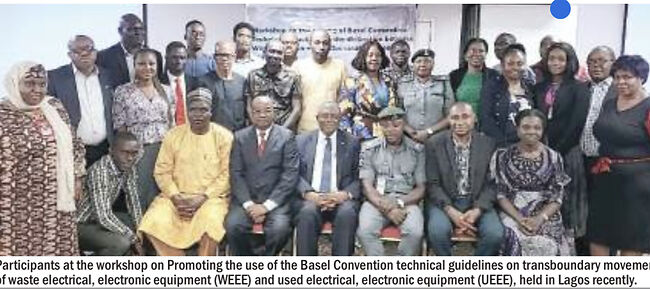
ELECTRONIC waste also known as e-waste continues to be the fastest-growing form of solid waste globally.
Its movement from one country to another in an indiscriminate manner is against the provisions of international law, specifically the Basel Convention, which Nigeria has signed and ratified.

The Basel Secretariat in Stockholm, Sweden, through the Basel Conven- tion Coordinating Centre for the African Region (BCCC-Africa), has therefore sought to create a clear understanding of e-waste among relevant stakeholders and their roles regarding how it should be managed under the convention.
Subsequently, BCCC-Africa, from January 18 to 20, hosted a second workshop for the project titled: ‘Promoting the use of the Basel Convention technical guidelines on transboundary movements of waste electrical, electronic equipment (WEEE) and used electrical, electronic equipment (UEEE), and enhancing associated national re- porting obligations in Nigeria.’
Professor Percy Onianwa, Executive Director of BCCC-Africa, in- formed the Nigerian Tribune that: “After the two-day inception workshop that was held in December last year in Lagos, this second workshop will focus primarily on the use of the guidelines for the distinction be- tween waste and non-waste.”
The workshop also involved firsthand interactions with customs officers involved in the control of the transboundary movement of used electrical electronic equipment.
Participants at the workshop included the Nigeria Customs Service, the National Environmental Safety and Regulatory Enforcement Agency (NESREA), formal recycling companies and collectors, the E-waste Producer Responsibility Organisation Nigeria (EPRON), Nigerian Shippers Council (NSC), Nigerian Ports Authority (NPA) and the Council for the Regulation of Freight Forwarding in Nigeria (CRFFN).
Digital divide and e-waste
“In an attempt to bridge the dig- ital divide, large quantities of used electronic equipment are exported to developing countries to assist in bridging the ‘gap’,” Professor Innocent Nnorom, a Senior Research Associate at BCCC-Africa, noted during his technical session on day one of the workshop.
“The export of used electronics leaves much to be desired: there is no distinction between items for reuse and items for recycling; there is no guarantee of the functionality of the imported devices, and most appliances that do work on arrival only have a short second life, as they were already old, obsolete and/or damaged during the transit.”
Professor Nnorom added that “Most used electrical and electronic equipment and e-waste shipments from Europe, USA and Asia end up in Nigeria.
“The Basel Convention on the Control of Transboundary Movement of Hazardous Wastes and their Disposal is an international law that asks countries to report on quantities of imported/exported e-waste.
“In some instances, Parties to the Basel Convention may have different views as to whether a particular TBM is subject to the Convention’s controls as a result of differing understandings of what constitutes waste.
“This is relevant when importing used and near end-of-life goods that soon become waste.
“There is considerable agreement that used goods are not waste if they are fully functional and intended for direct reuse.
What really is e-waste?
According to Nnorom, used electronics and electrical equipment are considered e-waste if:
“It is destined for disposal or recycling, instead of reuse, or its fate is uncertain; it is not complete, that is, essential parts are missing and it cannot perform its key functions; it shows a defect that materially affects its functionality and fails relevant functionality tests; or there is no regular market for the equipment.”
He added that shipment of used electronics and electrical equipment should not be considered trade in hazardous waste when it is: not destined for recovery or disposal operations; destined for direct reuse, or extended use by the original owner for the purpose for which it was originally intended.”
E-waste situation in Nigeria
The story of e-waste has been described as a sweet-sour story because e-waste contains both hazardous and valuable materials. This fact warrants a clear understanding of what e-waste is in order for it to be properly managed entirely, in order to ensure the e-waste story is more sweet than sour. E-waste quantities will continue to rise if the current narrative is not changed.
Dr Gilbert Adie, Senior Research Associate, BCCC-Africa, in his presentation at the workshop noted that “e-waste is still the fastest growing solid waste stream globally estimated to reach 74 million tonnes by 2030.
“57.4 million tonnes of e-waste was generated in 2021, growing by an average of 2 MT a year, estimated to be as heavy as the great wall of China.”
Dr Adie went on to say that “Nigeria generates an average of 1.2 million metric tonnes of assorted e-waste annually and receives an average of 60,000 metric tonnes from abroad.”
Only 17.4 percent of e-waste is known to be collected and properly recycled.
The global e-waste management market was valued at $49.88 billion in 2020 and is projected to reach $143.87 billion by 2028.
He advanced the environmentally sound management of e-waste.
“All stakeholders must come together to achieve the common goal of environmentally sound management of e-waste because what goes around comes around. If we turn our eyes away from the bad practices in the handling of e-waste such as burning circuit boards to extract useful materials, or dumping them in water bodies, it can come around to harm us,” Dr Adie told Nigerian Tribune.
EPR in Nigeria and e-waste
The Extended Producer Responsibility (EPR) programme is a government policy that assigns producers to be responsible for the post-consumer stage of a product’s life cycle
The EPR programme is based on the ‘Polluter Pays Principle’.
Every company whose products are consumed in Nigeria is required to comply with the EPR programme as indicated in the National Environment (Electrical/ Electronic Sector) Regulations.
Producers are therefore obligated to comply with the EPR policy and register with a Producer Responsibility Organisation (PRO).
The E-waste Producer Responsibility
Organisation Nigeria (EPRON) is the first PRO for electronic waste in Nigeria and has been in operation since 2019.
Part of EPRON’s responsibility is to aggregate producers’ funds accord- ing to their market share and use it to coordinate the collection and en- vironmentally sound management of e-waste, Ibukun Faluyi, executive secretary of EPRON, stated during her presentation at the workshop.
She added that EPRON plays a key role in the environmentally sound management of e-waste in Nigeria, and in the implementation of the Ba- sel Convention technical guidelines.
Faluyi advised consumers saying that “e-waste has no place in the dustbins. It should be kept for take- back. There are collection centres across the country.”
Nigeria’s laws on e-waste
There are existing laws in Nigeria on e-waste. The laws relating to e-waste control include: Environ- mental Impact Assessment Act Cap E12 LFN 2004, the Harmful Waste (Special Criminal Provisions) Act Cap HI, 1988 and updated in 2004; National Environmental (Sanita- tion and Waste Control) Regulation 2009.
Others are the National Environ- mental (Electrical Electronic Sector) Regulations S.I. No 23 of 2022 that has 18 schedules. The regulations cover new and used electrical and electronic equipment in Nigeria.
In her presentation at the work- shop, Ezinwanyi Udechukwu, NES- REA’s Head of Port Operations at the Lagos Liaison Office, stated that these regulations also specify that the export or transit of e-waste must be with a valid trans-boundary movement permit issued from the Federal Ministry of Environment.
According to her, under this reg- ulation, manufacturers, importers, distributors or retailers are to take back the end of life electrical/elec- tronic equipment (EEE) and set up collection points/centres. Also part of the regulation states that the im- portation of cathode-ray tubes (CRT) is banned.
She said that NESREA was collabo- rating with Nigeria Customs Service (NCS) through the Nigeria Integrated Customs Information System (NICIS) portal to monitor importation of used EEE. This enables NESREA carry out inspection of containers of used items at the ports of entry.
Udechukwu identified poor waste segregation at source and inadequate home grown technol- ogy to handle e-waste thereby making sustainable recycling very expensive.
Another challenge in the fight against e-waste, she noted, is that multinational companies are not complying or are unwilling to comply with the Extended Producer Responsibility for take-back scheme, among others.
Nigeria importing less used electronics?
Day two of the workshop saw the team of participants visit the Tin Can Island Port for a practical demonstration of the use of the Basel Convention technical guidelines on trans- boundary movements of e-waste. The visit, according to Professor Onianwa who led the team, was also meant to be a capacity building exercise for the Customs service.
Although the team did not meet any containers of used electronics to practicalise the guidelines with, the Customs authorities at the port informed the visitors that the service had observed a reduction in the importation of used electronics.
Speaking on behalf of the Customs Area Controller of Tin Can Island Port, Deputy Comptroller Aliyu said that “The NICIS has helped stem importation of e-waste. These items cause a huge menace to humans and the environment.”
He told the BCCC-Africa team that “We are prepared to interface and learn from you to know the distinction between used electonics and e-waste.”
The team was informed that the Customs now utilises non-intrusive inspection of containers using x-ray scanners.
At the Customs Ashaye Scanning Site, the team witnessed the oper- ation of a mobile scanning machine which began operation in October last year.
It was decided that the Basel Convention technical guidelines should be updated to cater for the novel, non-intrusive inspection of containers.







